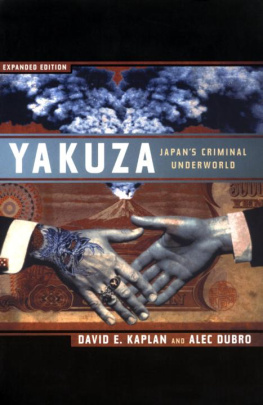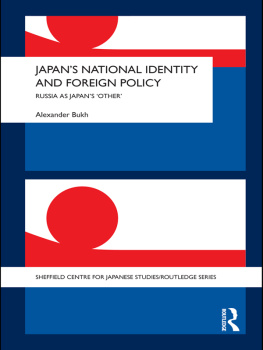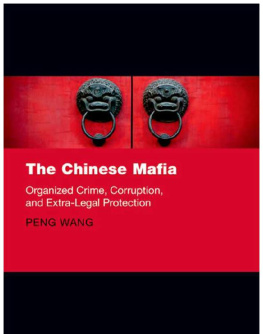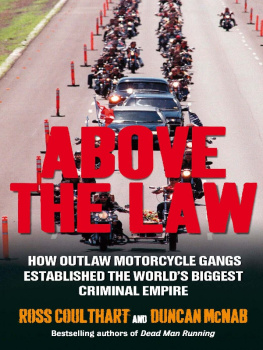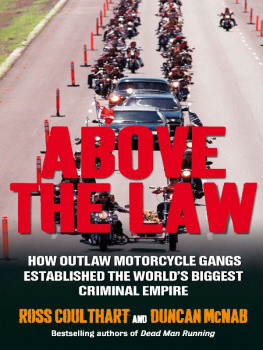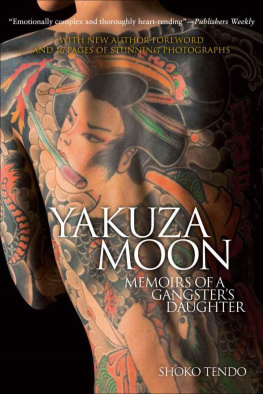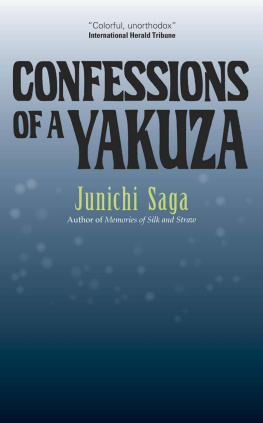YAI
YAKUZA
JAPAN'S CRIMINAL UNDERWORLD
EXPANDED EDITION
DAVID E. KAPLAN AND ALEC DUBRO




CONTENTS
vii
xi
xiii
xv
PART I: EARLY HISTORY
PART II: THE KODAMA YEARS
PART III: THE MODERN YAKUZA
PART IV: THE MOVE ABROAD
ACKNOWLEDGMENTS
THIS BOOK IS A COLLABORATIVE EFFORT. OVER THE COURSE OF OBSERVING the yakuza for nearly twenty years, we were helped by so many people in so many ways that it is, quite literally, impossible to thank them all. Our work on the first edition was aided by at least fifty researchers and reporters spread across five continents. The revised edition relied on dozens more.
We have, in addition, drawn on the work of countless others from academia, the media, law enforcement, and the underworld. Many of our sources cannot be named due to concern over job security and, in some cases, personal safety. We regret if others' contributions pass unnoticed here; this book would have been an impossible task without the assistance of all those friends and colleagues, and our heartfelt thanks go to all who helped in any way.
Our foremost thanks go to our old colleagues at the Center for Investigative Reporting, who made this book happen. Our gratitude goes out to Dan Noyes, Sharon Tiller, and David Weir; to Mark Schapiro for saving the project when it nearly died an unnatural death; and to the rest of the CIR family who so enthusiastically supported this work.
We owe three of our colleagues in Japan an equally important debt. Glenn Davis and the late, great John Roberts, two veteran Tokyo correspondents, contributed enormously at virtually every step of this project-from commenting on our initial proposal to arranging interviews, performing research, and critiquing our manuscript. Their expertise and experience helped produce the vast store of information that forms the heart of this book. In addition, their friendship, and that of their families, greatly warmed what was an otherwise freezing Tokyo winter. In addition, we are enormously grateful to the remarkable Michio Matsui, our friend, collabo rator, and cultural guide. Matsui-san first translated Yakuza into Japanese and proved to be an extraordinary resource and colleague.
Our colleagues at Nippon Hoso Kyokai (NHK), Japan's public broadcasting system, also are deserving of great thanks. Their careful arrangements secured interviews with leading yakuza, allowing American journalists an unprecedented look at the Japanese underworld. Despite countless cultural blunders on our part, NHK producers patiently and skillfully guided us along a sometimes treacherous path. Thanks to Sadaharu Inoue, who helped from the beginning, and to Hajime Suzuki, Atsushi Karube, and Yasuo Onuki.
Our translators and interpreters performed admirably both at home and abroad. Thanks to Reiko Makeuchi for courage far beyond the call of our meager payments; Professor Yuzuru Katagiri, Ike Matsuzaki, and K.T. for offering invaluable help in understanding not only a difficult language but a complex culture as well; and James Chun, Jon Joseph, and Taka Yamada for filling in at critical moments. On the revised edition, three others were similarly heroic and generous with their time: Hiroshi Suto, Kyoko Matsuda, and Michiko Toyama.
In Tokyo, our sincere gratitude goes to Ryuma Suzuki of the Sumiyoshikai. Special thanks also to Chuk Besher, who proved a constant source of ideas and encouragement. In addition, we were helped immeasurably over the years by many in the Japanese law enforcement community. Most prefer not to be named, but we would be remiss in not thanking Hiroto Ya- mazaki for his suggestions and hospitality, and Kanehiro Hoshino for his patience and wisdom. Two former top cops, Seiji lishiba and Raisuke Miyawaki, also offered invaluable guidance. And a handful of friends there were terrific resources over the years: David Bong, Andrew Marshall, Mark Schreiber-thank you so much.
Also in Tokyo, a hearty thanks goes to the estimable Bernard Krisher for his unique contributions to our project. Many others offered their time and suggestions: Dave Butts, Harry Godfrey, Brad Martin, Peter Shigeta, Fred Schmidt, Howard Snyder, Greg Starr. From Nippon Television, thanks much to Hisao Adachi, Yuko Fuse, Atsushi Hatayama, and Toshiya Sugi- moto. Jeanne Sather contributed mightily with research and news clips. We extend thanks to the staffs of the Foreign Press Center (especially Shige- yoshi Araki) and the Foreign Correspondents Club of Japan. Hajime Takano and Takao Toshikawa were generous with needed advice and research assistance, and Goro Fujita and Kenji Ino provided invaluable insights. And Tom Gill-thank you for helping on the Japanese edition.
Special thanks go to those around the globe who helped with research and interviews: Stan Correy in Australia, Mike Kepp in Brazil, Ramon Tulfo in the Philippines, Kay Landmann in Germany, Toshimitsu Shigemura in South Korea, and others in Thailand, Hong Kong, and elsewhere who must remain unnamed. Our researchers at the Center for Investigative Reporting also deserve enormous credit for digging up and compiling key sources of information: Susan Moran bore the brunt of this work. The efforts of Frances Dinkelspiel, Jennifer McNulty, and Brenda Sunoo are also greatly appreciated. And John Sweeney, librarian extraordinaire, thanks for your generous efforts over the years.
In the San Francisco Bay Area, we were helped by Professors Harumi Befu and Chalmers Johnson, who made available their considerable expertise in Japanese culture and politics. Lowell Bergman made invaluable contributions over the years. Thanks also to Sasha Besher, Brad Bunnin, Bonnie Burt, Tony Crittenden, Barbara Faison, Loren Kelly, John McKenna, Karl Schoenberg, Mike Sterrett, and others unnamed.
In Honolulu, special thanks go to Bill Sweet, Mike Fleming, and others who worked with the U.S. Customs Service there. Also in that city, we owe a good bit of Japanese giri to Professor Joe Tobin of the University of Hawaii, who painstakingly went over our original manuscript and made muchneeded suggestions. Jim Dooley and Keith Kaneshiro also helped a great deal over the years. And thanks to Bernie Ching and Ron Higa, formerly of the Honolulu Police Department; Hilton Lui, Don Carstensen, Steve Lane, Naomi Sodetani, and Ken Szymkowiak.
In Los Angeles we thank the many veterans of the LAPD who have helped, in particular Yoichi Ikuta, George Min, John Vach, and Jimmy Sakoda. Also in L.A., thanks to Dwight Chuman, Shigeharu Higashi, and Kurashima-san. In New York, thanks to Marnie Inskip and the late Charles Kades, and to our law enforcement sources in the region.
In Washington, D.C., we thank Russell Adise, Don Goldberg, Pharis Harvey, Larry Johnson, John Mintz, Raphael Perl, and Gordon Witkin; Manuel Gonzalez and John Leonard, formerly with the President's Commission on Organized Crime; Tom Melcher for helping sort things out at a critical time; and many others. David Kaplan extends special appreciation to his editors at U.S. News, Peter Cary and Susan Headden, for tolerating a sometimes crazed schedule and interests on the other side of the globe.

